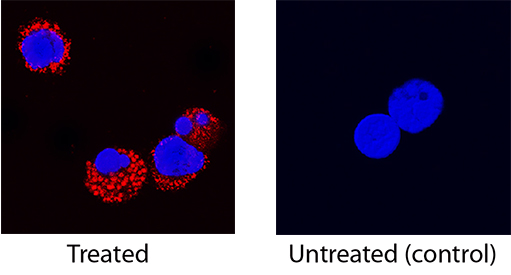Canine GM-CSF Antibody Summary
Ala18-Lys144
Accession # P48749.1
Applications
Please Note: Optimal dilutions should be determined by each laboratory for each application. General Protocols are available in the Technical Information section on our website.
Scientific Data
 View Larger
View Larger
Cell Proliferation Induced by GM‑CSF and Neutralization by Canine GM‑CSF Antibody. Recombinant Canine GM-CSF (Catalog # 1546-GM) stimulates proliferation in the TF-1 human erythroleukemic cell line in a dose-dependent manner (orange line). Proliferation elicited by Recombinant Canine GM-CSF (15 ng/mL) is neutralized (green line) by increasing concentrations of Goat Anti-Canine GM-CSF Antigen Affinity-purified Polyclonal Antibody (Catalog # AF1546). The ND50 is typically 2-8 µg/mL.
 View Larger
View Larger
GM‑CSF in Canine PBMCs. GM-CSF was detected in immersion fixed canine peripheral blood mononuclear cells (PBMCs) treated with Calcium Ionomycin and PMA using Goat Anti-Canine GM-CSF Antigen Affinity-purified Polyclonal Antibody (Catalog # AF1546) at 15 µg/mL for 3 hours at room temperature. Cells were stained using the NorthernLights™ 557-conjugated Anti-Goat IgG Secondary Antibody (red; Catalog # NL001) and counterstained with DAPI (blue). Specific staining was localized to cytoplasm. View our protocol for Fluorescent ICC Staining of Non-adherent Cells.
Reconstitution Calculator
Preparation and Storage
- 12 months from date of receipt, -20 to -70 °C as supplied.
- 1 month, 2 to 8 °C under sterile conditions after reconstitution.
- 6 months, -20 to -70 °C under sterile conditions after reconstitution.
Background: GM-CSF
GM-CSF was initially characterized as a factor that can support the in vitro colony formation of granulocyte-macrophage progenitors. It is also a growth factor for erythroid, megakaryocyte, and eosinophil progenitors. GM-CSF is produced by a number of different cell types (including T cells, B cells, macrophages, mast cells, endothelial cells, fibroblasts, and adipocytes) in response to cytokine or inflammatory stimuli. On mature hematopoietic cells, GM-CSF is a survival factor for and activates the effector functions of granulocytes, monocytes/macrophages, and eosinophils (1, 2). GM-CSF promotes a Th1 biased immune response, angiogenesis, allergic inflammation, and the development of autoimmunity (3-5). It shows clinical effectiveness in ameliorating chemotherapy-induced neutropenia, and GM-CSF transfected tumor cells are utilized as cancer vaccines (6, 7). The 22 kDa glycosylated GM-CSF, similar to IL-3 and IL-5, is a cytokine with a core of four bundled alpha ‑helices (8-10). Mature canine GM-CSF shares 49-57% amino acid sequence identity with mouse and rat GM-CSF and 69-72% with feline, human, and porcine GM‑CSF. GM-CSF exerts its biological effects through a heterodimeric receptor complex composed of GM-CSF R alpha /CD116 and the signal transducing common beta chain (CD131) which is also a component of the high-affinity receptors for IL-3 and IL-5 (11, 12). In addition, GM‑CSF binds a naturally occurring soluble form of GM‑CSF R alpha (13). The activity of GM‑CSF is species specific between human and mouse, although human GM‑CSF is active on canine cells (14, 15).
- Martinez-Moczygemba, M. and D.P. Huston (2003) J. Allergy Clin. Immunol. 112:653.
- Barreda, D.R. et al. (2004) Dev. Comp. Immunol. 28:509.
- Eksioglu, E.A. et al. (2007) Exp. Hematol. 35:1163.
- Cao, Y. (2007) J. Clin. Invest. 117:2362.
- Fleetwood, A.J. et al. (2005) Crit. Rev. Immunol. 25:405.
- Heuser, M. et al. (2007) Semin. Hematol. 44:148.
- Hege, K.M. et al. (2006) Int. Rev. Immunol. 25:321.
- Kaushansky, K. et al. (1992) Biochemistry 31:1881.
- Diederichs, K. et al. (1991) Science 254:1779.
- Nash, R.A. et al. (1991) Blood 78:930.
- Onetto-Pothier, N. et al. (1990) Blood 75:59.
- Hayashida, K. et al. (1990) Proc. Natl. Acad. Sci. USA 87:9655.
- Pelley, J.L. et al. (2007) Exp. Hematol. 35:1483.
- Shanafelt, A.B. et al. (1991) J. Biol. Chem. 266:13804.
- Hogge, G.S. et al. (1990) Cancer Gene Ther. 6:26.
Product Datasheets
Citations for Canine GM-CSF Antibody
R&D Systems personnel manually curate a database that contains references using R&D Systems products. The data collected includes not only links to publications in PubMed, but also provides information about sample types, species, and experimental conditions.
3
Citations: Showing 1 - 3
Filter your results:
Filter by:
-
Persistent Infection of a Canine Histiocytic Sarcoma Cell Line with Attenuated Canine Distemper Virus Expressing Vasostatin or Granulocyte-Macrophage Colony-Stimulating Factor
Authors: K Marek, F Armando, VM Nippold, K Rohn, P Plattet, G Brogden, G Gerold, W Baumgärtne, C Puff
International Journal of Molecular Sciences, 2022-05-31;23(11):.
Species: Canine
Sample Types: Cell Lysates
Applications: Western Blot -
Preventive and therapeutic effects of gene therapy using silica nanoparticles-binding of GM-CSF gene on white blood cell production in dogs with leukopenia.
Authors: Choi EW, Koo HC, Shin IS, Chae YJ, Lee JH, Han SM, Lee SJ, Bhang DH, Park YH, Lee CW, Youn HY
Exp. Hematol., 2008-06-11;36(9):1091-7.
Species: Canine
Sample Types: Serum
Applications: ELISA Development -
Effects of GM-CSF gene transfer using silica-nanoparticles as a vehicle on white blood cell production in dogs.
Authors: Choi EW, Shin IS, Chae YJ, Koo HC, Lee JH, Chung TH, Park YH, Kim DY, Hwang CY, Lee CW, Youn HY
Exp. Hematol., 2008-04-02;36(7):807-15.
Species: Canine
Sample Types: Serum
Applications: ELISA Development
FAQs
No product specific FAQs exist for this product, however you may
View all Antibody FAQsReviews for Canine GM-CSF Antibody
There are currently no reviews for this product. Be the first to review Canine GM-CSF Antibody and earn rewards!
Have you used Canine GM-CSF Antibody?
Submit a review and receive an Amazon gift card.
$25/€18/£15/$25CAN/¥75 Yuan/¥2500 Yen for a review with an image
$10/€7/£6/$10 CAD/¥70 Yuan/¥1110 Yen for a review without an image




